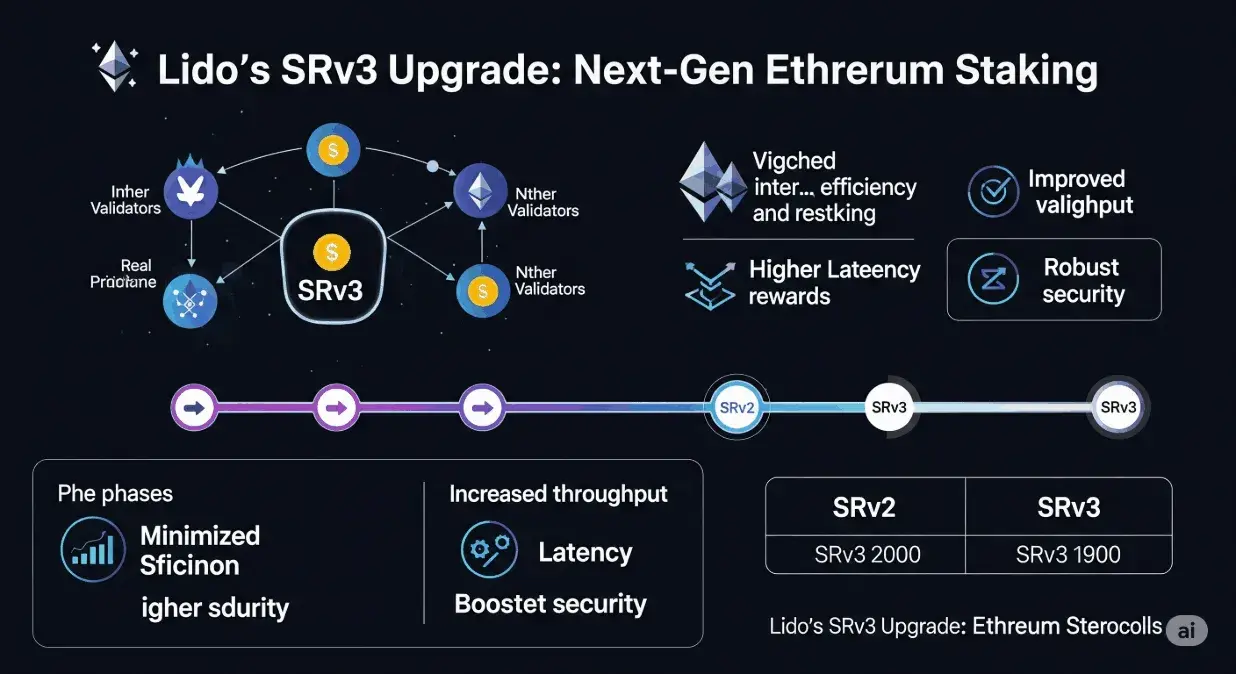The decentralized autonomous organization (DAO) behind Lido, the leading liquid staking protocol on Ethereum, is gearing up for a significant technical transformation. Following the monumental Ethereum Pectra hard fork in May 2025, which introduced crucial validator management improvements, Lido is set to unveil its ambitious SRv3 upgrade. This pivotal update will fundamentally shift Lido’s validator model from fixed 32 ETH units to dynamic balances, enabling easier and more flexible validator management, while promising improved rewards and a reduction in network load.
This forthcoming upgrade is not merely a routine software update but a comprehensive overhaul of Lido’s core staking architecture. It underscores Lido’s proactive strategy to align with Ethereum’s evolving roadmap, particularly in light of EIP-7251 (part of the Pectra upgrade), which allows for the consolidation of multiple smaller validators into larger, more efficient units, managing up to 2,048 ETH. This move is designed to bolster Lido’s resilience, optimize its operational efficiency, and cement its position at the forefront of the liquid staking landscape.
A Phased Rollout for a Smarter Staking Architecture
To facilitate this complex transition, the Lido network has outlined a two-phase rollout, commencing with the highly anticipated SRv3 upgrade, expected to launch in the first half of 2026. These changes are built upon the robust foundation of the Staking Router, which serves as the protocol’s core coordination layer. Introduced in 2024 with SRv2, the Staking Router replaced Lido’s earlier monolithic model with a more modular design, currently featuring Curated, Community Staking, and SimpleDVT modules. The SRv3 upgrade will build on this modularity, bringing unprecedented flexibility and scalability.
A central feature of the SRv3 upgrade is its shift to a balance-based accounting system. Unlike the current unit-based model, which treats validators in rigid 32 ETH increments, the new system will allow the protocol to manage validators as dynamic balances. This groundbreaking change will significantly streamline validator merging and drastically improve scalability across the network. The move to this dynamic model necessitates substantial updates across the protocol’s handling of deposits, withdrawals, and reward distribution. However, the anticipated benefits—including greater flexibility, enhanced efficiency for node operators, and a more seamless user experience for stakers—are expected to far outweigh the development complexity.
Additionally, the SRv3 upgrade will introduce direct deposit functionality. This feature will enable new stake to be routed directly into validators through the protocol, bypassing certain intermediary steps. Initially, this functionality will be limited to approved participants, ensuring a controlled rollout and rigorous testing, with the potential for broader access over time as the system proves its stability and efficiency. Crucially, all validator consolidations and significant on-chain actions related to SRv3 will be managed via EasyTrack, Lido’s proven governance tool designed for executing secure and efficient on-chain proposals. This ensures a transparent and community-governed process for overseeing this critical upgrade.
Boosting Efficiency, Flexibility, and Decentralization
Beyond validator consolidation and direct deposits, the SRv3 upgrade is poised to introduce a more sophisticated stake allocation system. This intelligent system will empower the network to distribute stake dynamically, based on nuanced validator performance metrics and comprehensive risk profiles. Elements of this advanced approach have already undergone testing through the Community Staking Module v2, demonstrating their efficacy, and will now be integrated directly into the core protocol. This move is critical for optimizing the overall health and security of the Lido network.
The detailed development roadmap for SRv3 upgrade clearly prioritizes validator consolidation. Alongside this, significant improvements to stake onboarding processes and the implementation of optimized allocation strategies are key objectives. These changes are meticulously designed to achieve several critical outcomes: enhance Lido’s overall resilience against various network stressors, significantly lower operational costs for node operators (making participation more economically viable), and proactively mitigate stake concentration risks by encouraging a more distributed and balanced validator set.
Stay informed, read the latest crypto news in real time!
According to Lido’s development team, the continuous development progress of the SRv3 upgrade represents a major advancement toward building a more efficient, secure, and highly scalable staking infrastructure for the entire Lido ecosystem. By embracing Ethereum’s evolving capabilities and implementing these innovative solutions, Lido aims to solidify its role as a cornerstone of liquid staking, providing a robust and decentralized platform that serves the needs of both individual stakers and institutional participants in the burgeoning digital asset economy. As the liquid staking landscape continues to mature, Lido’s commitment to cutting-edge technical innovation through upgrades like SRv3 positions it for sustained leadership and growth.

